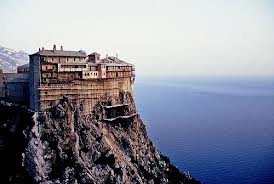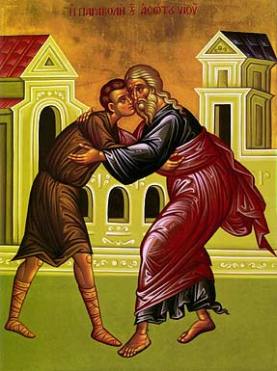THE WAY BACK TO THE FATHER’S HOUSE, PRODIGAL SON PART 2. FINDING THE PRESENCE OF CHRIST IN THE HEART ACCORDING TO SAINT GREGORY PALAMAS.
Previously, I posted his understanding of the prodigal son, stating that we can draw parallels to the spiritual life and indeed refer to a, “prodigal mind.” The mind has wandered out of the Father’s house, the heart. The movement of the mind to the heart is circular per Saint Dionysios. That is to say, the mind reflexes, returns back, to the essence, which is the heart. To use orthodox metaphysics, the heart is the essence and the mind is the energy.
The way back to the heart is difficult. How does Saint Gregory advise us to find the heart?
I want to give an except from the second discourse. This is the apophatic way, the way of denial. What is it not.
1. There must be a ceasing of intellectual operations which do not seek after God.
For they assert no one is able to participate in perfection and holiness, not having found the true glory concerning created existences, further, it is not possible for this (i.e. holiness trans.) to exist or have it without disjunctive thought and syllogism and analysis. Triads.1.3.84
This is not obscurantism. Rather, the true telos, or end, of the intellect’s motion is to see God. If we are not directed to that, then we have failed. Mental operations are such that the intellect perceives an idea – joins or divides from it – then makes a syllogism. In other words, proposition A is true, proposition B, therefore C. The syllogism has reached it’s συμπερασμα, or conclusion.
These mental acts do not give αισθεσις or perception, of spiritual truth. These acts pertain to νους, or intellect. The knowledge of God is beyond mind. The mind must cease to rationalize and simply seek the feeling of God’s presence , an αισθεσις. This feeling or perception comes only by the illumination of God’s grace. As Saint Gregory is fond to quote,
καρδία ὀρθὴ ζητεῖ αἴσθησιν στόμα δὲ ἀπαιδεύτων γνώσεται κακά Prov.15:15 A right heart seeks perception, but the mouth of the untaught seeks mischief.
The ceasing of the intellect is called keeping the Sabbath by Saint Gregory. To celebrate the rest, the Israelites had to stop working. It is also the same as Golgotha. At Golgotha, the place of a skull, the Logos was slain. At our own personal Golgotha before our personal descent to Hades (see St. Silouan on this), the depths of our inner sin, we must have our logos slain. Reason must stop to arrive at the Truth beyond reason.
2. The attention is actually directed toward the heart.
This is not metaphorical. The attention is actually directed to the interior, to the heart. Having directed our mind there, we still do not see the Light according to Saint Gregory. There is a veil over the heart, impeding the light from being perceived. So the veil on the heart then we must cast aside, by self examination, the open and hidden sins of the heart. This veil, καλλυμα, according to Saint Paul (2 Cor.4:1-6) is the covering of νοηματα, thoughts. The thoughts cast aside, the veil is in effect removed and we are then δεχτικος, capable to receive the grace of God. The actual process of removing the veil, the painful process of repentance, is what permits us to see the Lord. However, seemingly contradictory, It is a pure gift to perceive God’s grace. Some saints struggled for years, so how should we expect an instant renewal? God does grant it at a moment many times- He did to Cornelius in Acts 10.
3. Practically, Saint Gregory enjoins repeating the Name of the Lord upon every breath, while sending the intellect to the heart.
For there is quietude by this entering in and going out, the spirit upon every ingoing thought, but especially in the case of those practicing stillness in body and reasoning.For those who spiritually sabbatize are these who also resting from all their proper works, because it is attainable, on the one hand, everything discursive and produced by discursive reasoning and which has been elaborately reasoned about knowledge of the powers of the soul they completely strip away, namely, work and all the aesthetic helps, and quite simply every bodily activity, which is in our power, yet on the other hand, what is not in our power -the end just as respiration, so long as it is in our power, this does not cease.But all these identical things follow painlessly and without much care for those who make progress hesychastically, for by the same entrance of the soul to itself, of necessity, perfectly automatically all things occur. Triads 1.2.51-53
Now, why is it that this is commanded, and why might this take so long? Because the practice engenders love within the soul. And love is ultimately what tethers us to the Lord, as it alone will exist in the eschaton. This will not come easy. The practice should be enjoined at the very least until we have entered into communion with Him.
But for those who are beginners, not one of what things said would you know without hard word accompanying.And as it follows then with love being patient (“for love bears all things,” we then instruct in order to establish patience in life, as through this we arrive at love).And what further is necessary to say about these things?
Since nothing more can be said, I trust the Saint. The next section describes how the invocation of the Lord’s Name removes the seven evil thoughts, spirits, and replaces them with the Seven Spirits of God. I invite the reader to look at how the tree of knowledge of good and evil relates to this.




